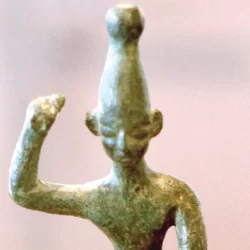In this presentation you’ll learn about the core creed of the bible, both in the Old and New Testaments, the Shema, and how that relates to the smattering of texts in which Jesus may be called “God.” If Yahweh alone is God then how can Jesus be God too? Are there two Gods or is something else going on? The answer is the principle of agency. Jesus can be called God because he represents God.
It is much more likely that Jesus is called God because he represents God, just like Moses did to Pharaoh, the judges did to Israel, and the king did as God’s anointed one. Jesus is the ultimate proxy, God’s agent through whom God’s word became a human being and spoke to his people. Jesus was utterly transparent, always doing his father’s works, pursuing his God’s will, and speaking Yahweh’s words and thus can rightly be called God. He’s not a separate God, but God’s human representative. To meet Jesus is to meet God, not because he is God in himself, but because God was so at work within him.
—— Links ——
- For a written version of this talk, see my article, “Explanations to Verses Commonly Used to Teach that Jesus Is God”
- Intro music: Jazzy Frenchy by bensound.com. Licensed under Creative Commons: By Attribution 3.0 License.







And did you know?
Jesus never said, “I am Yahweh, your God.”
Moses did! Deut. 29.1-6
😉
Moses and the prophets were sent by God, i.e., God’s agents (Exo. 3:13-15, Jeremiah 7:25, John 16, 33). But Jesus as God’s son is God’s “sent one” par excellence (Matt. 21:37-38). That Jesus is the human Messiah sent by God who represents God (the Father) is a (the?) key theme of the Gospel of John. “I can do nothing on my own. As I hear, I judge, and my judgment is just, because I seek not my own will but the will of him who sent me” (John 5:30). The one sent is “equal” (in power, authority, not in essence) to Him Who Sends, because the one sent has been granted that authority by the Sender (John 5:18). This is why I don’t agree, Sean, that Thomas “unambiguosly” calls Jesus “God” in John 20:28. There is only one God in the Gospel of John — The Father. “When you see me you see the Father”. When Thomas sees the once dead, now alive Jesus the Lord Messiah, he “sees” the Father. Thomas knows that his (Thomas’ and Jesus’!) God raised Jesus from the dead. If there is anything that is clear in the Gospel of John it is that Jesus is not God, but rather he is sent by God.
Neither does Hebrews 1:8 unambiguously call Jesus God (nor does Psalm 45 unambiguously call the Davidic king, God). The Hebrew for sure, and Greek the best I can see, can be understood as “Your throne is God forever”. Meaning, your authority (throne) to rule is forever, because it is God (from God). Similarly, “God is my rock” means God is my confidence and strength. “My portion is Yahweh” means what I care about in life are the things of God. The phrase כסאך אלוהים does not have to be understood as a direct address (vocative), and therefor is NOT unambiguous. Compare JPS translation: “Thy throne given of God is for ever and ever.” Also, if you take Hebrews 1:8 as a reference to calling Jesus God, then you are equivocating on the meaning of God in the very next verse (just like Biblical Unitarians accuse trinitarians of doing).
This means we are down to *zero* unambiguous references to Jesus as God in the New Testament.
Further on Psalm 45 and Hebrews 1:8: “Your throne/authority is God” is agency language. “By what authority do you do these things?” We all know the answer.
Great presentation
Thank you for an excellent presentation, Sean. Although the concept of divine agency is sadly foreign to most mainstream Christians, Biblical scholars have long been aware of its central role in the scriptures. Here are a few quotes that might interest your listeners:
“The heavenly chorus that acclaimed God “worthy” (Rev. 4:11) now acclaims Christ “worthy” (5:9). Yet despite the shift in focus, the Lamb does not take God’s place but is honored because he serves as God’s agent, carrying out God’s purposes.”
– Craig R. Koester, Revelation (Anchor Yale Bible), p. 388
“If a slave might function as a stand-in for his master, how much more might a lord’s son, particularly since the notion of “agency” was intrinsic to that of sonship. The son would have the full authority of his father, the owner of the vineyard, and, as heir, would also represent the father’s interests.”
– Joel Green, Luke (New International Commentary on the New Testament), p. 707
“[In Daniel 2:46] Nebuchadnezzar fell upon his face and paid great honor to Daniel. The word for “homage” can denote the worship of a deity. It is quite clear, however, from the king’s conversation with Daniel that Nebuchadnezzar merely regarded Daniel as a worthy priest and representative of God and was honoring him in this category. In other words, even the king understood that Daniel was the ambassador and representative of God but not deity himself. It is probably for this reason that Daniel permitted the king to do what he did.
An interesting parallel is found in Josephus, recording the instance where Alexander the Great bowed before the high priest of the Jews. When Parmenion, one of his generals, asked him why, when ordinarily all men would prostrate themselves before Alexander the Great, he had prostrated himself before the high priest of the Jews, Alexander replied, ‘It was not before him that I prostrated myself, but the God of whom he has the honor to be high priest.’”
– John F. Walvoord, Daniel (The John Walvoord Prophecy Commentaries), p. 92
Excellent teaching; however, an even more outstanding slide presentation that is loaded with first class supporting information, is logically organized, and is very clearly presented all the way through! Great to have access to all of that in one single location on-line. Thanks for all the time and effort that you put into this, Sean. I will certainly recommend it to as many others as possible.